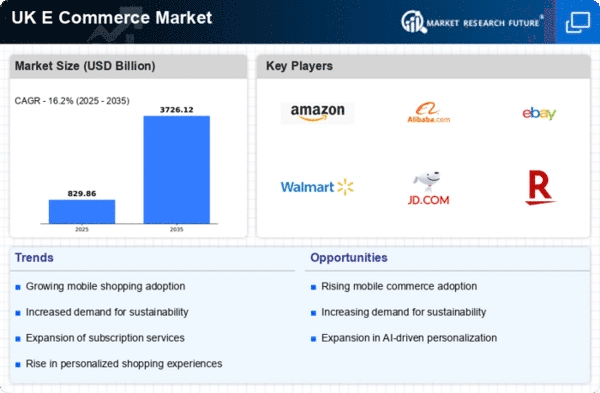Changing Consumer Behaviour
Consumer behaviour is evolving rapidly, significantly impacting the e commerce market. The rise of convenience-driven shopping has led to an increase in online purchases, with 70% of UK consumers preferring to shop online for its ease and accessibility. Additionally, the demand for faster delivery options is reshaping logistics strategies, compelling retailers to adopt same-day or next-day delivery services. This shift in consumer expectations is prompting businesses to enhance their online platforms and improve customer service, which is crucial for maintaining competitiveness in the e commerce market. As consumers continue to prioritize convenience, the market is likely to see sustained growth.
Expansion of Payment Options
The expansion of payment options is a critical driver in the e commerce market, as it caters to diverse consumer preferences. In the UK, the adoption of digital wallets and buy-now-pay-later services has surged, with over 40% of online shoppers utilizing these methods in 2025. This trend indicates a shift towards more flexible payment solutions, which can enhance the shopping experience and reduce cart abandonment rates. Furthermore, the integration of cryptocurrencies as a payment option is gaining traction, appealing to tech-savvy consumers. By offering a variety of payment methods, businesses can attract a broader customer base and potentially increase sales in the e commerce market.
Increased Focus on Cybersecurity
As the e commerce market continues to grow, the focus on cybersecurity has become paramount. With the rise in online transactions, consumers are increasingly concerned about data privacy and security. In 2025, it is estimated that 60% of UK consumers will prioritize shopping with retailers that demonstrate robust cybersecurity measures. This heightened awareness is prompting businesses to invest in advanced security technologies, such as encryption and multi-factor authentication, to protect customer information. By addressing these concerns, companies can build trust and loyalty among consumers, which is essential for sustaining growth in the e commerce market.
Regulatory Changes and Compliance
Regulatory changes are influencing the operational landscape of the e commerce market. In the UK, new regulations regarding data protection and consumer rights are being implemented, requiring businesses to adapt their practices accordingly. Compliance with the General Data Protection Regulation (GDPR) and other consumer protection laws is essential for maintaining customer trust and avoiding hefty fines. As companies navigate these regulatory frameworks, they may need to invest in compliance technologies and training, which could impact their operational costs. However, adherence to these regulations can enhance brand reputation and customer loyalty, ultimately benefiting the e commerce market.
Technological Advancements in E Commerce
The e commerce market is currently experiencing a surge in technological advancements that are reshaping consumer interactions. Innovations such as artificial intelligence (AI) and machine learning are enhancing customer experiences by providing personalized recommendations and improving inventory management. In 2025, it is estimated that AI-driven solutions could account for approximately 30% of all online sales in the UK. Furthermore, the integration of augmented reality (AR) is allowing consumers to visualize products in their own environments before making a purchase. This technological evolution not only streamlines the shopping process but also increases consumer confidence, thereby driving sales in the e commerce market.
















